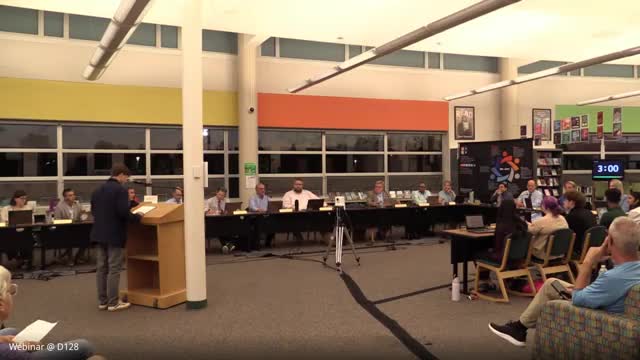Libertyville-area school board hears heated public debate over gender-support guidelines after locker-room incident
Get AI-powered insights, summaries, and transcripts
Subscribe
Summary
Dozens of community members urged the District 128 Board of Education either to uphold or to rescind gender-support practices after public comments described an incident in which male students used a girls’ locker room; speakers offered conflicting accounts and some alleged legal violations and incomplete FOIA responses.
Dozens of residents, parents and students addressed the District 128 Board of Education on Sept. 29 as the district faces renewed controversy over its gender support guidelines after an incident last school year in which at least one male student entered a Libertyville High School girls’ locker room, public commentators said.
The dispute drew sharply contrasting views from speakers. "This happened," said Arnie Navarro, identifying himself as a District 128 taxpayer and lawyer, and later stating that the district provided incomplete records in response to his public-records requests. Navarro said his FOIA requests showed "absolutely no objective criteria or process by which District 128 decides to grant or deny a GSP [gender support plan]" and criticized the district for not giving parents advance notice.
The disagreement has polarized speakers and focused attention on the district’s written procedures and communication. Supporters of the district’s gender-support guidelines said the policies protect vulnerable students and comply with Illinois law. Crystal Larson, executive director of the LGBTQ Center Lake County, told the board: "If allowing transgender girls to fully participate as the gender they know themselves to be is so damaging to the education of the students here, how is it that both D128 schools are ranked above more than 23 other national schools?" She said removal of trans inclusion would likely violate Illinois law and harm students.
Other speakers urged the board to maintain a rules-based approach that balances privacy and safety. Brandy Gasser, a parent and taxpayer, cited suicide-attempt statistics from recent studies, saying policies that allow affirming treatment "literally save lives" and that living in an accepting community "reduces the risk of attempted suicide by 50 percent." Several other parents and graduates asked the board to prioritize student well-being and inclusivity.
A number of speakers opposed the district’s handling of the incident and asked for legal accountability or policy changes. In public comment, Jake Schulman described the locker-room incident in strongly worded terms and listed federal and state authorities he said the district had violated, including Title IX and the Fourteenth Amendment. Schulman also said he had "communicated with the FBI" and that "they are aware of the situation," attributing that claim to his own communications.
Board members did not adopt any new policy or take a formal vote on the gender-support guidelines during the meeting. The board acknowledged it will hold an executive session later in the evening on other personnel and legal matters, and multiple speakers referenced FOIA requests and the district’s prior communications about the locker-room incident. No formal administrative action to change the gender-support policy was recorded on the Sept. 29 agenda.
The debate appeared to reflect both substantive concerns and broader political tensions in the community: some speakers called for protecting transgender students’ access and safety in school facilities, while others demanded clearer procedural criteria and parental notice when a Gender Support Plan affects shared spaces.
The board accepted public comment and moved on to other agenda items; it later announced a closed session and said no action would follow from that session. Members of the public seeking documents or clarification were repeatedly told to use FOIA channels; one speaker said the district’s FOIA officer denied multiple requests, a claim the board did not resolve in public session.
Looking ahead, the board has not scheduled a formal policy vote on the gender-support guidelines at this meeting. Community members on both sides of the issue told the board they plan to continue engagement, including requests for records and possible legal action, while advocates asked the board to preserve inclusive practices.
